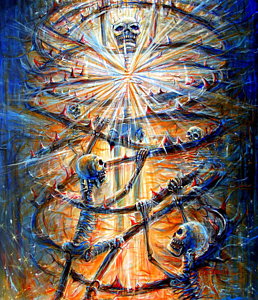Moksha
The True Identity
"From where does suffering arise?" asked the laborer.
"From ignorance of the Self," replied The Emperor.
"But what is the end of suffering?" asked the artisan.
"Knowledge of the Self," replied The Emperor.
"But how do we know ourselves?" asked the scholar.
"You already do," replied The Emperor, "you are simply unaware of it."
- The Absolute Mantras, Chapter 1, Verses 56-62
Causes
Each Zamzian expresses their spirituality in different ways along the journey to Moksha. Some engage in rituals and pray to The Transcendent Emperor or The Godhead every day in hopes that their veneration will cause them to learn something about themselves, while others wander the earth, seeking the within without. The Absolute Mantras outline five separate Roads to Moksha, each of which the Emperor followed during one of his incarnations - these Roads are not mutually exclusive, but few people dedicate themselves to more than one at a time.
- The Road of Action: The most common path, these people try to find enlightenment through working in a divine manner - free from greed, expectation, or passion. Once one embraces mindful action and views everything they do on an objective and cosmic basis, one comes closer to knowing themselves through contrast. Some people believe this road entails dedicating one's life to a single craft and perfecting it, but detractors claim that a wider breadth of experiences brings one closer to Moksha rather than a more limited and single-minded lifestyle. The Transcendent Emperor walked this Road when He undertook and completed the monumental task of uniting the continent under His vision.
- The Road of Blades: The path of conflict, the followers of this Road seek to discover themselves by chipping away at the impurities of the soul, as a ruby shines only once cut and polished on something harder. This path is symbolic of warfare and death, but many follow it in a metaphorical manner, never seeking out battle and violence... but plenty interpret the Road as literal, wandering Zamzara and seeking out the strong for battle. The Transcendent Emperor embodied this Road during His famous Walkabout, before the Zamzian Empire was even an inkling and He was merely a journeyman travelling among the primal clans of Zamzara.
- The Road of Knowledge: The path of intellectuals, these adherents believe in Truth above all. Perhaps the most difficult Road, it is characterized through contemplation and collective discussion as its practitioners seek to cleanse themselves of ignorance and misconceptions. Only through the realization of the true reality can one begin to know the true self. The Transcendent Emperor took this Road throughout His entire life, always reflecting upon His deeds and ideals to arrive at the truth and meaning behind them. To these adherents, we already have Moksha, we are simply unaware of our own freedom.
- The Road of Love: The second most common path, those on this Road seek Moksha through the love and worship of the universe itself as a whole union. This can take form in multiple ways - some worship the Emperor directly out of gratitude for His deeds, while others seek to understand the relationships that bind everything, physical or spiritual, into a cohesive whole. The Transcendent Emperor embodied this Road while building His Empire, taking care to give everyone a place in it and giving it a place in the world.
- The Empty Road: The most esoteric of paths, it is debated if it is even a Road at all. This path is characterized by absence - of the total variety. By emptying one's mind and soul, they becomes ready to receive the whole of the universe within, a representation of cosmic awareness. Unlike the other Roads, the Absolute Mantras make no mention of how to follow the Empty Road, only that it leads to Moksha as the others do. This was the final Road that The Transcendent Emperor walked at the end of His life, after He gave the throne to His eldest son.
Symptoms
One who has attained Moksha has transcended beyond all earthly and mortal boundaries, having gained cosmic awareness and become one with The Godhead. They are freed from pain, sorrow, anger, and happiness - they want for nothing because they are everything. Unbound by karmic cycles, the barriers between kalpas are meaningless distractions and one learns everything about all of their previous and future selves. This distinction has led to centuries of religious debate as to whether or not Moksha and free will are mutually exclusive - an argument that has gone nowhere very quickly. Perhaps most importantly, one who has Moksha develops an implacable sense of calmness and harmony that radiates from their very being, having embodied unity of the Self.
Enlightenment is, of course, a spectrum. Only The Transcendent Emperor has attained the "true" enlightenment, but there are millions who have tread the same path as Him, many of whom are unsuccessful in their efforts. Those who overcome the illusions of material reality come into union with The Godhead, but all of them have only reached "partial" enlightenment, and they do not have control over Its domain. Unlike the Emperor, these Risha are birthed into the world knowing only of their past, not their future, but they are often respected by those around them for their prior spiritual achievements.
Remove these ads. Join the Worldbuilders Guild




Comments